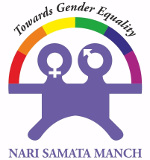- Sakhya (Combating Violence against Women) 1997-2003:
Ford Foundation’s support strengthened Manch’s work for prevention of gender based violence. Manch conducted awareness events on the issue at many cities and towns in Maharashtra. In Maharashtra, there was a series of murder of young women out of one sided attraction. The issue was largely discussed with youths in Maharashtra to stress on Right of girl to say no. A rally was organised in Pune, for which Bollywood actor Amir Khan was present. He condemned such acts of violence against women and mentality behind it. He gave a pledge to youths to accept and respect the right of the girls to say no.
- Nirmal Vasa (A pledge for health) 1998-2001:
While working in urban areas, Manch was aware of need to work in rural and tribal areas. Hence a project was undertaken to generate awareness as well as capacity building of health workers from within the community. With the support of McArthur Foundation, we started working in villages near Alandi and tribal villages in Ambegaon block of Pune district. A programme called ‘Nikopa’ was undertaken to have dialogue with adolescent students on changes in adolescence, sexuality education and value education.
- Youth for Change:
In continuation with earlier health project, Manch undertook a project to mobilize tribal youths in the areas of village governance and development. This project enabled us to develop and conduct sexuality workshops with youths.
- Aaple Pani (2003-2005):
Manch participated as implementing agency in this rural water supply and sanitation project of Maharashtra Government. We worked in seven villages of Pune district on social processes. The work was fruitful in a sense of participation of women and other deprived sections in the process of planning as well as reduction in drudgery of women. Some villages opted for schemes such as roof water harvesting.
- Arise (All Round Improvement in School Education – 2015-2021) :
With the help of Tech Mahindra Foundation, we worked in four Zilla Parishad schools of Mulshi block. Imparting constructivist pedagogies, strengthening of school committees and community extension are the domains of intervention to develop school as a fully functional institution. Katkari Khelghars were operational at these four villages and we have continued it even after the project ends.
- Hero’s Academy(working with youth – 2016-18):
-ITVS support enabled us to take ahead the work done during Samajhdar Jodidar project. A structured process of dialogue was implemented with youth groups for three months, in which they used to identify a task in the interest of women and girls in villages. Hero academy felicitated the youths on completion of task and award them a certificate.
- Study on Female Genital Mutilation/cutting in India(2017-18):
-Few communities in India still practice female genital mutilation. Speak out for FGM is a group working to raise awareness against it. Speak out for FGM and Manch conducted a study of survivors of FGM. It is supported by Maharashtra Foundation and Manion’s Daniel.
Core program area and projects
- Katkari Development (since 2000):
Nari Samata Manch first came in close contact with their hardships, around year 2000 while working in Ambegoan block on a rural health project. Katkari is one of the primitive tribes in Maharashtra and they are recognized as a ‘Particularly Vulnerable Tribal Group’ (PVTG). This erstwhile forest dwelling community was engaged in making Kaththa (or Kaat in Marathi). The term ‘Katkari’ itself is reminiscent of their occupational identity of bygone age. British policies restricted their access to raw material from forest, which led to loss of their traditional livelihood.
Katkaris were compelled to shift their base in search of work. But with lack of education and no skills to survive in mainstream society, they mostly earned their livelihood from seasonal wage work such as agriculture labor or labor on brick kilns. Pressure of constant search of work led them to migrate temporarily. Hence, despite coming closer to village communities, Katkaris are mostly living on the edge. They lack awareness on having necessary documents/id proofs. The legal battle for two years gave a way to get caste certificates for them in Pune district. If katkari children complete education, they can have better life. With this objective, Manch initiated Khelghar for katkari children.
- Katkari Khelghar:
is an initiative started in 2008-09. Manch initiated ‘Khelghar’; a program supporting and facilitating education among Katkari children and bring educational awareness among the parents. This initiative was started in 2006-07. The process of eight years started yielding good results. The first batch of 5 katkari students appeared for class 10th in 2014 and all of them passed with good score and continued their education. In 2015, a katkari boy in khelghar stood first in his school.
At present 8 khelghars are operational in Mulshi block. These have been supported over the years by different agencies such as Volkhart Foundation, Tech Mahindra Foundation as well as individual donors. But there is need to reach to katkari children in more remote villages. Mulshi and Maval blocks in Pune district accommodates many katkari settlements. There are Katkari hamlets in Maval and Mulshi blocks and we wish to reach to these remote hamlets.
